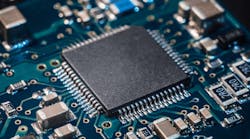Broadcom, trying to defend its dominance in the market for networking chips, introduced its latest line of Ethernet switches that can be programmed for many different purposes and replace costly custom hardware in data centers. Broadcom, under pressure from startup Barefoot Networks, also open sourced a programming language that can be used by customers to add functions to the switch.
Broadcom's Trident 4 switch spans speeds of 2 trillion to 12.8 trillion bits of data per second. That matches the speed of its upcoming Tomahawk 3 product. The Tomahawk range is targeted at the throughput and latency demands of cloud server infrastructure. But the Trident product line is programmable and can be used in corporate data centers, routers and switches that need a broader set of network protocols.
Trident 4 delivers high port density while limiting latency and reducing power, Broadcom said. To battle information overload in data centers, the switch can scale to 256 SerDes cores supporting 50G PAM-4. "Trident 4 is delivering a 4 times increase in bandwidth versus its predecessor Trident 3," said Ram Velaga, senior vice president of switch products at Broadcom, which has started sampling Trident 4 to customers.
Broadcom, which is based in Silicon Valley and led by chief executive Hock Tan, is the biggest player by far in the market for chips used in Ethernet switches, which industry analysts estimate at $3 billion annually. Customers range from cloud service vendors like Amazon, Microsoft and Google to OEMs including Cisco Systems, Juniper Networks, Arista Networks and Dell, all of which sell products with Trident chips inside.
The market for networking chips is heating up. Nvidia agreed in March to acquire Mellanox Technologies for $6.9 billion, moving into the market for Infiniband and Ethernet switch chips. Intel has also struck a deal to buy Barefoot, which has also started shipping switch chips that can be programmed to help handle the deluge of data entering data centers. Marvell has also increased its investment in data center switches.
Barefoot's technology may be more than a distant threat. The startup doubled the speed of its latest Tofino chip to 12.8 trillion bits of data per second. Once it enters production, the Tofino 2 switch is set to rival Broadcom's Tomahawk 3 and Trident 4. As the world's largest producer of server chips, Intel could put pressure on Broadcom by pushing Barefoot's silicon and software to its broad customer base.
Broadcom's latest Trident chips also can be programmed to handle a range of network protocols and other chores inside data centers. Customers can add functions using the open Network Programming Language (NPL), which was introduced by Broadcom to rival Barefoot's open P4 standard. With it, customers can alter Broadcom's Trident 4—and its future Jericho 2 product—by relying on their own programmers.
The new networking chips can be programmed for lots of purposes, according to Broadcom. The chips can take over function from dedicated hardware devices like load balancers. Customers can program the chips to detect intrusions and prevent being overloaded in digital assaults known as denial-of-service attacks. The chips can be updated during operation to cut down on the chances of dropping data packets.
